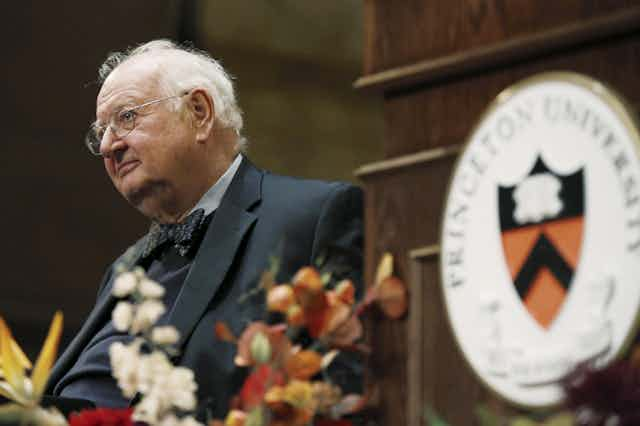On Monday in the staff common rooms of economics departments throughout the world, I doubt anyone was complaining about the award of this year’s Nobel prize for economics to Angus Deaton.
It is a choice perhaps with a view to addressing criticism that the discipline of economics can sometimes seem like ideology rather than science. It also appears to favour the micro over the macro; the experience of individuals rather than the grand plans of policy makers.
The first area of research mentioned in the Nobel Committee’s citation of Deaton’s work was his development of the Almost Ideal Demand (AID) System with John Muellbauer of Oxford in the early 1980s. This system of equations allows policy makers to estimate not only how the price of a good affects its own demand but also how the price of other goods affect the demand for that good. So, if for example, VAT is increased on cigarettes, economists can estimate the likely effects on alcohol consumption.
The initial attempts to estimate these demand equations were unsatisfactory due to the way that the equations were written down rather than due to statistical or computational difficulties. It turned out that these equations were not flexible enough to allow certain key predictions of consumer theory to be tested. For example, will raising the price of diesel affect demand for petrol with the same magnitude as the affect of a change in the price of petrol on the demand for diesel? The contribution of Deaton and Muellbauer’s system of equations was that the key predictions of consumer theory could be tested rather than just assumed.

Questioning theories
Deaton then turned his focus to theories about income, savings and consumption. Macroeconomists up until the early 1990s felt that their Permanent Income Hypothesis (PIH) explained the real world pattern that aggregate consumption changes less than aggregate income. It was a case of theorists wanting to see their theory come true in the real world data. Deaton realised that when you fully think through the implications of PIH, then income should be smoother than consumption. This is because sometimes unexpected increases in income are, to some extent, permanent and not always completely random blips that disappear.
However, this wrinkle was not borne out by the Permanent Income Hypothesis and it was a finding that led to a whole reassessment of a key plank of macroeconomic theory. Deaton’s work resulted in the use of individual level longitudinal data to supplement the existing use of aggregate data. Again, his work was about inserting people and their experiences into economic theory.

Development of data for policy
Then, in the 1990s, Deaton’s work focused on the study of poverty in developing countries. Up until that point, development economics had many theories but less than convincing empirical evidence to back up those theories. Deaton was instrumental in the design and collection of household survey data in many parts of the developing world, particularly India.
Survey design and data collection can sometimes be a less than exciting area of research. However good quality data are vital to testing theory and too many economists don’t take responsibility for the quality of the data that they use. Deaton’s work in this area led him and others to research important topics such as measuring poverty, calorie consumption and how assets are divided within a household in the developing world.
Optimist
To get an accessible version Deaton’s work, I would recommend his 2013 book: The Great Escape: Health, Wealth and the Origins of Inequality published by Princeton University Press. The book is pitched at a popular level but is based on extremely rigorous interrogation of data. Using a series of deceptively simple graphs, Deaton charts the very long-term trends in health and economic circumstances. It is a book that discuses history, medical science, industrial policy, development economics and political economy.

He argues that improvements in our scientific understanding of disease and the role of public health measures, such as clean water supplies, had the major role in the improvements in our health. He shows how the Western world has largely escaped from the ravages of contagious diseases and that now the challenge is from the chronic diseases of old age. Reading the book, one is struck by his optimistic view of the world. He really has faith in science’s ability to improve the well-being of mankind. And yes, that does include economics.
However, he also keenly aware of our continuing problems. He discusses how perverse incentives in the pharmaceutical industry have needlessly allowed communicable diseases to continue to claim lives in parts of the developing world. Later in the book, he convincingly argues, that long-term aid to countries does more a lot more harm than good because despotic regimes, with an external source of income, have less of a need to collect taxes and so become even less accountable to their own people.
Debate on the future of economics
The later point, hints that Deaton is not afraid to say controversial things. A few years ago Deaton asked some big questions about the future of empirical economics. The recent trend in applied microeconomics, especially in development economics has been a move away from traditional theory towards the use of experiments. For example, randomising participation in education programmes to reduce sexually transmitted diseases in developing countries, and then evaluating the effect of the programme. Deaton argued that this approach to economics has limited external validity – that an HIV prevention program aimed at teenage girls in Kenya may not have the same effect as a chlamydia prevention program aimed at working women in South Africa.
Deaton called for the applied microeconomists not to abandon economic theory in favour of experiments but instead to think more deeply about the consequences of economic theories and how they can be tested using real-world data. This is the approach he has followed throughout his career and what has led to him win a Nobel Prize.

